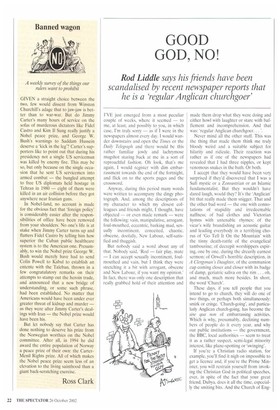Banned wagon
A weekly survey of the things our rulers want to prohibit GIVEN a straight choice between the two, few would dissent from Winston Churchill's adage that to jaw-jaw is better than to war-war. But do Jimmy Carter's many hours of service on the sofas of murderous dictators like Fidel Castro and Kim II Sung really justify a Nobel peace prize, and George W. Bush's warnings to Saddam Hussein deserve a 'kick in the leg'? Carter's supporters like to point out that during his presidency not a single US serviceman was killed by enemy fire. This may be so, but only because on the single occasion that he sent US servicemen into armed combat — the bungled attempt to free US diplomats held hostage in Tehran in 1980 — eight of them were killed in an air collision before they got anywhere near Iranian guns.
In Nobel-land, no account is made for the obvious fact that 'foreign policy' is considerably easier after the responsibilities of office have been removed from your shoulders. No one's life is at stake when Jimmy Carter turns up and flatters Fidel Castro by telling him how superior the Cuban public healthcare system is to the American one. Presumably, to win the Nobel prize George W. Bush would merely have had to send Colin Powell to Kabul to establish an entente with the Taleban, thrown in a few congratulatory remarks on their attempts to stamp out the heroin trade, and announced that a new bridge of understanding, or some such phrase, had been established. No matter that Americans would have been under ever greater threat of kidnap and murder — as they were after Jimmy Carter's dealings with Iran — the Nobel prize would have been his.
But let nobody say that Carter has done nothing to deserve his prize from the Norwegian worthies on the Nobel committee. After all, in 1994 he did award the entire population of Norway a peace prize of their own: the CarterMenil Rights prize. All of which makes the Nobel peace prize seem less of an elevation to the living sainthood than a giant back-scratching exercise.
Ross Clark


















































































 Previous page
Previous page